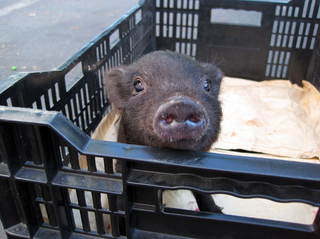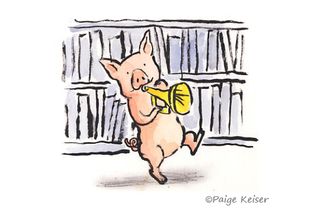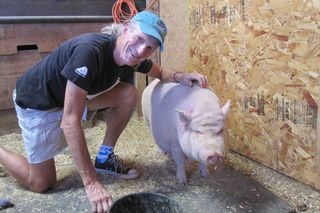
Kiss the Pig Contests, Cheap Laughs and Bullying (Op-Ed)

Marc Bekoff, emeritus professor at the University of Colorado, Boulder, is one of the world's pioneering cognitive ethologists, a Guggenheim Fellow, and co-founder with Jane Goodall of Ethologists for the Ethical Treatment of Animals. This essay is adapted from one that appeared in Bekoff's column Animal Emotions in Psychology Today. He contributed this article to LiveScience's Expert Voices: Op-Ed & Insights.
Given that schools rightfully aspire to zero tolerance for bullying, they should be at the forefront of encouraging students to be respectful to each other, to their teachers and to all those around them, human and nonhuman alike.
So, why are schools (and other organizations) holding events such as "kiss the pig" contests to reward students for reading or to motivate them for fundraising efforts? Such spectacles send the reckless message that stunts based on contempt and ridicule are not only condoned but also encouraged. While I fully realize that many people who dream up and partake in these contests see them as being "fun", if they knew about the stress experienced by the pig I'm sure they'd recognize the harm that's being done.
Whether or not a student or teacher is well liked, it's clear that the person who gets the most votes and has to kiss a pig is considered a "loser." In "kiss a pig" contests, these sensitive animals are surrounded by shrieking kids and the pigs have no understanding of what is happening to them. The piglets often scream in fright, urinate and struggle to escape.
Schools should recognize that these kinds of incentives encourage students to be openly disdainful of their teachers and also foster derision and disrespect toward both educators and pigs. Instead of mocking pigs, students could learn a lot of positive lessons about kindness and compassion from them.

Pigs aren't mindless
Pigs are loyal friends and amiable companions. Smart and inquisitive, they enjoy exploring and uncovering new and interesting things. They dream and also enjoy listening to music and getting back rubs. Research conducted on the cognitive and emotional lives of pigs has been published in prestigious peer-reviewed journals and clearly shows they are extremely clever, that they love to play, and (like dogs) — when pigs are stressed they can even become pessimists. Calling someone "a pig" should actually be a compliment.
Sign up for the Live Science daily newsletter now
Get the world’s most fascinating discoveries delivered straight to your inbox.
Clearly, pigs are highly emotional sentient beings who are capable of experiencing joy, happiness, fear, stress and pain. Just as none of us would appreciate being held up in front of a jeering crowd, neither do pigs. And, neither would most dogs.

Bullying is bullying, no matter who the victim is. The teacher who would stop a child from being picked on should extend the same compassion toward animals. Educators must recognize the danger of instigating group antipathy (the so-called "mob mentality") and how doing so prompts otherwise kind people to behave badly.
If students were taught how sensitive and personable pigs really are, I feel certain these contests would be stopped once and for all. Young people can learn to appreciate pigs for the truly remarkable beings they are. Pigs offer valuable lessons in forgiveness, resilience and confidence, and I know this firsthand from a pig I met a few years ago named Geraldine. [From Animals, We Can Learn Generosity and Forgiveness (Op-Ed ) ]
Geraldine was a rescued potbellied pig living at a lovely sanctuary called Kindness Ranch. Although she had known nothing but cruelty before being rescued, she was personable and clearly interested in assessing me for acceptance as a new friend. Once I passed muster and she trusted me, she demanded nothing but companionship and belly rubs. Geraldine had every reason to be hostile and fearful, but she put her bad past behind her and moved forward with optimism and cheer. The idea of subjecting Geraldine or any of her kin to derision or discomfort is utterly unthinkable.

Links between animal abuse and human abuse
In light of the devastating consequences of bullying, schools are doing the right thing to take steps to curb anti-social behavior. And those steps must include extending kindness to everyone, including other animals, as there are well-established links between abusing nonhuman animals and bullying humans (see also and "Animal Cruelty and Antisocial Behavior: A Very Strong Link").
With so many innovative and humane ways to motivate kids, schools are failing themselves and their students by promoting animal exploitation for cheap laughs. These sorts of events should be stopped immediately and the reasons for doing so should be made clear. Both humans and other animals will benefit.
Bekoff's most recent Op-Ed was "'The Dog's Telltale Tail." This article was adapted from "Kiss a Pig Contests, Cheap Laughs, and Bullying" in Psychology Today. The views expressed are those of the author and do not necessarily reflect the views of the publisher. This version of the article was originally published on LiveScience.
Most Popular



